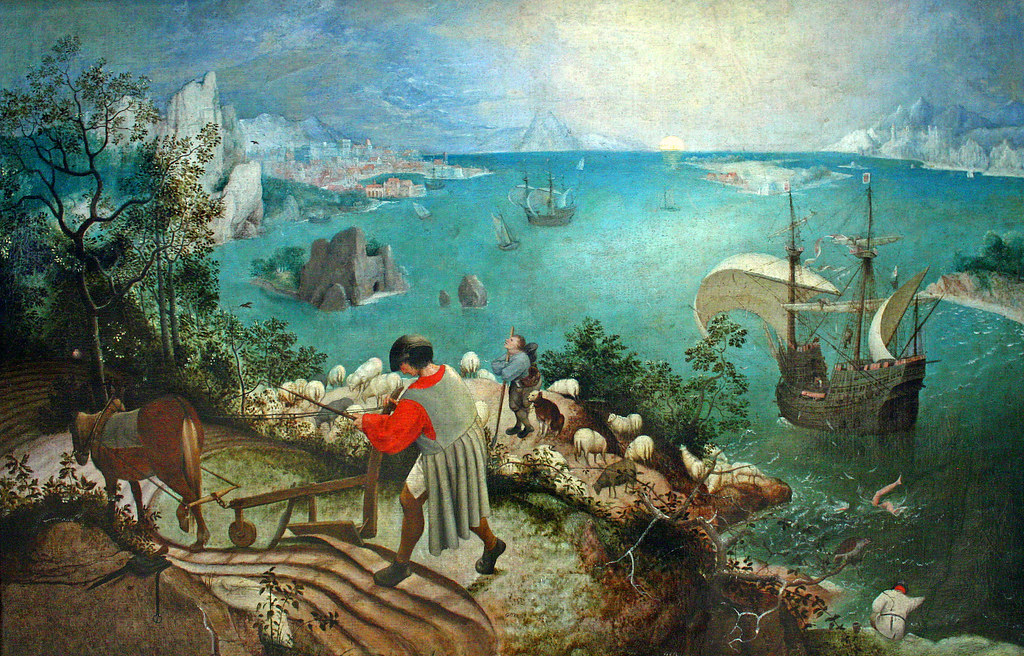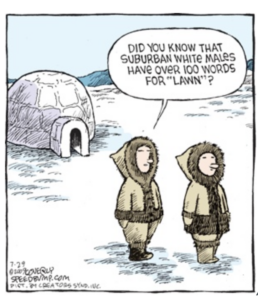Everyday tragedies

Standing peacefully in the sunshine today, queueing to buy some fresh salmon from the fishmonger who comes every Tuesday, I fell to thinking about the contrast between this pastoral scene and what’s going on in Ukraine. Here we are, engaged in our everyday routines, while elsewhere in Europe, atrocity rules, apparently unstoppably. Which in turn brought to mind one of my favourite poems, Auden’s Musee des Beaux Arts, inspired by Breughel’s painting of ordinary life proceeding while Icarus falls, unnoticed, to his watery death.
In Breughel’s Icarus, for instance: how everything turns away
Quite leisurely from the disaster; the ploughman may
Have heard the splash, the forsaken cry,
But for him it was not an important failure; the sun shone
As it had to on the white legs disappearing into the green
Water, and the expensive delicate ship that must have seen
Something amazing, a boy falling out of the sky,
Had somewhere to get to and sailed calmly on.
And we, too, are sailing calmly on.
Quote of the Day
”It is better to have loafed and lost than never to have loafed at all.”
- James Thurber
Musical alternative to the morning’s radio news
Ry Cooder | Living on Straight Street | live in studio.
Long Read of the Day
Why ‘Slaughterhouse-Five’ Resonates 50 Years Later
Lovely review essay by James Parker on Kurt Vonnegut’s great novel, a work that has never got old and has never waned in energy. It’s the only kind of masterpiece that could match the enormity of the (Western) war crime in Dresden in the Second World War.
There are novels so potent, and so perfected in their singularity, that they have the unexpected side effect of permanently knocking out the novelist: Nothing produced afterward comes close. Had Russell Hoban written no books before Riddley Walker, and no books after it, his reputation today would be exactly the same. Should William S. Burroughs, post–Naked Lunch, or Joseph Heller, with the last line of Catch-22 on the page (“The knife came down, missing him by inches, and he took off.”), have tossed their typewriters out of the window? Probably. And Kurt Vonnegut, at the age of 46, with Mother Night and God Bless You, Mr. Rosewater (those twin magnificences) under his belt, was projected into a state of creative culmination/exhaustion by Slaughterhouse-Five.
And…
Fifty years have passed since the publication of Slaughterhouse-Five. It’s the same age as me. And the older I get, and the more lumps fall off my brain, the more I find that rereading is the thing. Build your own little cockeyed canon and then bear down on it; get to know it, forward and backward; get to know it well. So I don’t know how many times I’ve read Slaughterhouse-Five. Three? Four? It never gets old, is the point. It never wanes in energy. This book is in no way the blossom of a flower. Slaughterhouse-Five is more in the nature of a superpower that the mutant author had to teach himself to master—and then could use, at full strength, only once.
The self-training took decades. The mutating event was, as always, brief. Between February 13 and February 15, 1945, Allied bombers dropped nearly four thousand tons of high explosives and incendiaries on the historic German city of Dresden. The effect was elemental: Air became fire. Vonnegut, an American prisoner of war, was there—but 60 feet underground. Captured during the Battle of the Bulge, conveyed to Dresden by boxcar, and billeted in a derelict slaughterhouse as the bombs fell, he was sheltering with some fellow POWs and a couple of dazed German guards in a basement meat locker. They emerged to rubble, ash, twisted metal, death. Somewhere between 18,000 and 25,000 people (we still don’t know) had been killed.
Really worth your time.
The ‘Soft’ Impacts of Emerging Technology
Interesting reflections on how to evaluate the longer-term impact of technologies.
Getting a handle on the various ways that technology influences us is as important as it is difficult. The media is awash with claims of how this or that technology will either save us or doom us. And in some cases, it does seem as though we have a concrete grasp on the various costs and benefits that a technology provides. We know that CO2 emissions from large-scale animal agriculture are very damaging for the environment, notwithstanding the increases in food production we have seen over the years.
However, such a ‘balanced’ perspective usually emerges after some time has passed and the technology has become ‘stable’, in the sense that its uses and effects are relatively well understood. We now understand, better than we did in the 1920s, for example, the disastrous effects of fossil fuels and CO2 emissions. We can see that the technology at some point provided a benefit, but that now the costs outweigh those benefits. For emerging technologies, however, such a ‘cost-benefit’ approach might not be possible in practice.
My commonplace booklet

This Blog is also available as a daily email. If you think that might suit you better, why not subscribe? One email a day, Monday through Friday, delivered to your inbox. It’s free, and you can always unsubscribe if you conclude your inbox is full enough already!
